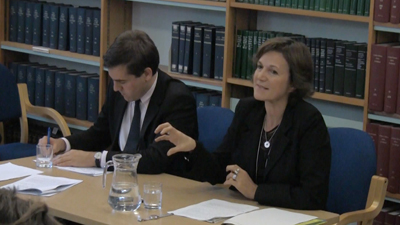'International Organisations and Sanction and Accountability Mechanisms: Trends and Prospects' by Professor Laurence Boisson de Chazournes
Duration: 40 mins 47 secs

| Description: |
The Lauterpacht Centre for International Law (LCIL), University of Cambridge hosts a regular Friday lunchtime lecture series on key areas of International Law. Previous subjects have included UN peacekeeping operations, the advisory jurisdiction of the International Court of Justice, the crime of agression, whaling, children and military tribunals, and theories and practices for proving individual responsibility criminal responsibility for genocide and crimes against humanity.
This lecture, entitled 'International Organisations and Sanction and Accountability Mechanisms: Trends and Prospects', was delivered at the Lauterpacht Centre on Friday 11th November 2011 by Professor Laurence Boisson de Chazournes, Professor of Law, University of Geneva. For more information about the series, please see the LCIL website at www.lcil.cam.ac.uk |
|---|
| Created: | 2011-11-11 16:19 |
|---|---|
| Collection: | LCIL International Law Seminar Series MOVED |
| Publisher: | University of Cambridge |
| Copyright: | T.C. Grant |
| Language: | eng (English) |
| Keywords: | Sanctions; World Bank; International organisations; Corruption; Lauterpacht Centre for International Law; |
| Abstract: | The profile of international organizations has significantly evolved in the last decades. International organizations have been exposed to new demands. In response they have developed innovative rules and mechanisms, which in turn required specific policing measures.
An important example of this tendency is the sanction mechanism established by the World Bank against corruption and fraudulent practices of companies and individuals involved in the Bank’s activities. Following the creation of this sanction mechanism by the World Bank, several regional development banks have established similar procedures. The World Bank Sanction mechanism is an example of the progressive integration of principles rooted in different legal traditions and legal fields. It was initially created as a non-jurisdictional mechanism, but has progressively been made more judicial in character. Over time it has developed a degree of procedural formality and complexity, which resembles that of litigation in international and national courts. |
|---|---|
| Format | Quality | Bitrate | Size | |||
|---|---|---|---|---|---|---|
| MP3 | 44100 Hz | 125.0 kbits/sec | 37.34 MB | Listen | Download | |
| MP3 | 16000 Hz | 31.25 kbits/sec | 9.34 MB | Listen | Download | |
| Audio Interchange File Format (AIFF) | 1.34 Mbits/sec | 411.67 MB | Listen | Download | ||
| Audio Interchange File Format (AIFF) | 250.01 kbits/sec | 74.68 MB | Listen | Download | ||
| Advanced Audio Coding (AAC) | 44100 Hz | 126.37 kbits/sec | 37.75 MB | Listen | Download | |
| Advanced Audio Coding (AAC) | 16000 Hz | 31.79 kbits/sec | 9.50 MB | Listen | Download | |
| Auto * | (Allows browser to choose a format it supports) | |||||

